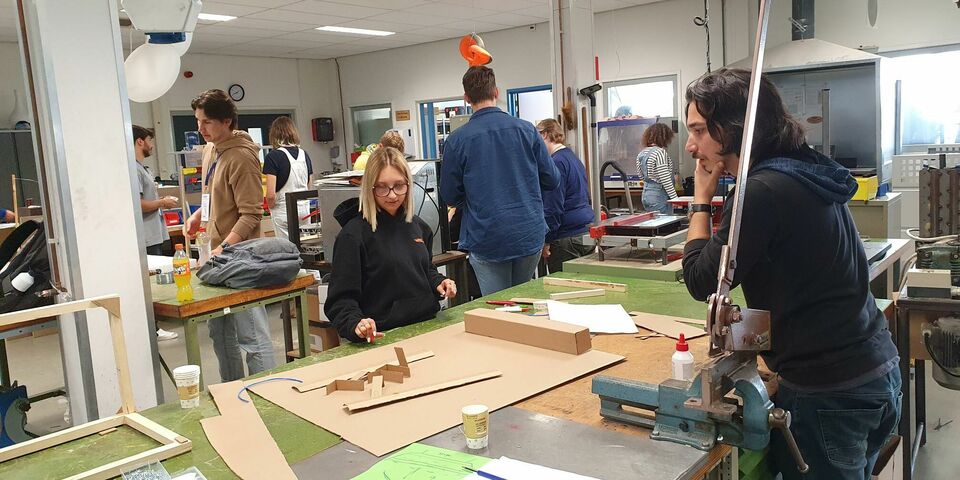Work groups mix students from Summa, Fontys and TU/e
It's one of the goals the organizers of Challenge Week 040 have set themselves this week: to get thinkers and doers working together. Drawn from three educational institutions in Eindhoven, the seventy students participating are tasked with devising practical solutions to societal problems for clients, problems relating either to the design of the campus or to the experience of attending a festival.
Challenge Week 040 this week brings together ten students from TU/e, thirty from Summa Engineering and thirty from Fontys Pulsed to work in small groups on tomorrow's challenges. Like, how can you avoid losing one another at a festival? Or, what would a pop-up library on the campus look like, or how could you shorten the wait at a bar? The mixed groups are spending four days together working within the categories Campus of the Future and Festival of the Future. Any useful innovations they produce will benefit the stakeholders, which include event organizer This is Live Group and the local library, Bibliotheek Eindhoven.
This is the first time that students at the three educational institutions have formally worked together. And it's taking some getting used to, for both students and coaches. The TU/e students are volunteers. Not so the students from Summa and Fontys; this is a mandatory part of their studies.
Aditya, a first-year student of Mechanical Engineering, saw this activity announced during the Intro. Thinking it would be a good way to fill the ‘empty’ week before the start of the academic year, the Indian student signed up. He knows that a friend of his volunteered but withdrew (as did nine others from TU/e, ed.) due to the calculus test that TU/e first-years have to sit next week. “I'll be studying in the evenings.”
A little less motivated are Summa student Pieter and Fontys student Dennis. They've been put in a group with two others and have to work out how you'd find your friends at a festival after you've gone off to get a beer and the WIFI has gone on the blink. As an experienced festivalgoer Dennis doesn't see what the problem is. “I go to a festival three times a month. I sometimes hire a party bus to get there, for fifty or sixty friends. We never lose each other, because we simply agree where we'll wait when we go to the bathroom or the bar. The group splits up into smaller groups and those people keep an eye on each other. I'm finding it hard to look at this another way.” It's not just the assignment he's disappointed with, it's also the task of coming up with an offline solution. “We're all technically minded, but we still don't have any idea what we can build.”
On Wednesday, co-organizer Peter Biekens uses the lunch break to tell the groups (see photo) that it's important they think up a name, and quickly. “You're going to be building a prototype and you'll need to have it tested by another team. By then your group will need a name.”
The two Fontys students Wojciench, a Pole, and Mirén, who's Mexican, have come up with the name Boiling Frogs for their group, which also includes Aditya. They're doing the same assignment as Dennis and Pieter, and have lots of ideas. “We're going to divide the festival tent into sections so that you can be more specific about exactly where you are. But we've also got an online idea. We're making wristbands with GPS tracking and LED lights in various colors. Then, if there's a calamity, it'll help the organizers steer the festivalgoers in the right direction. They can send the red lights to the red corner, and the blues to the blue corner.”
Diversity
For the students this seems like a fun start to their degree program. Mirén is very pleased with the way things are organized. “We're working with good materials and cool Makita tools, I like the lunches and there's a social program for later in the day,” she says, “but the coaches are treating us like we're all high-school voc. ed. students who need their hands held. We're already independent and can manage.” Neither she nor Wojciench are impressed with the mixed groups.
Biekens gets that. “But that's actually the important thing here: learning to work together. We want university students to see that they can pick up tools and build a prototype and we want the high-school vocational ed. students from Summa to know they have no reason to feel inferior. I hope that after this week every participant will have learned to work together better, will have found where their own strengths lie and experienced that together you make each other stronger. In short, that their self-confidence has grown.”



Discussion